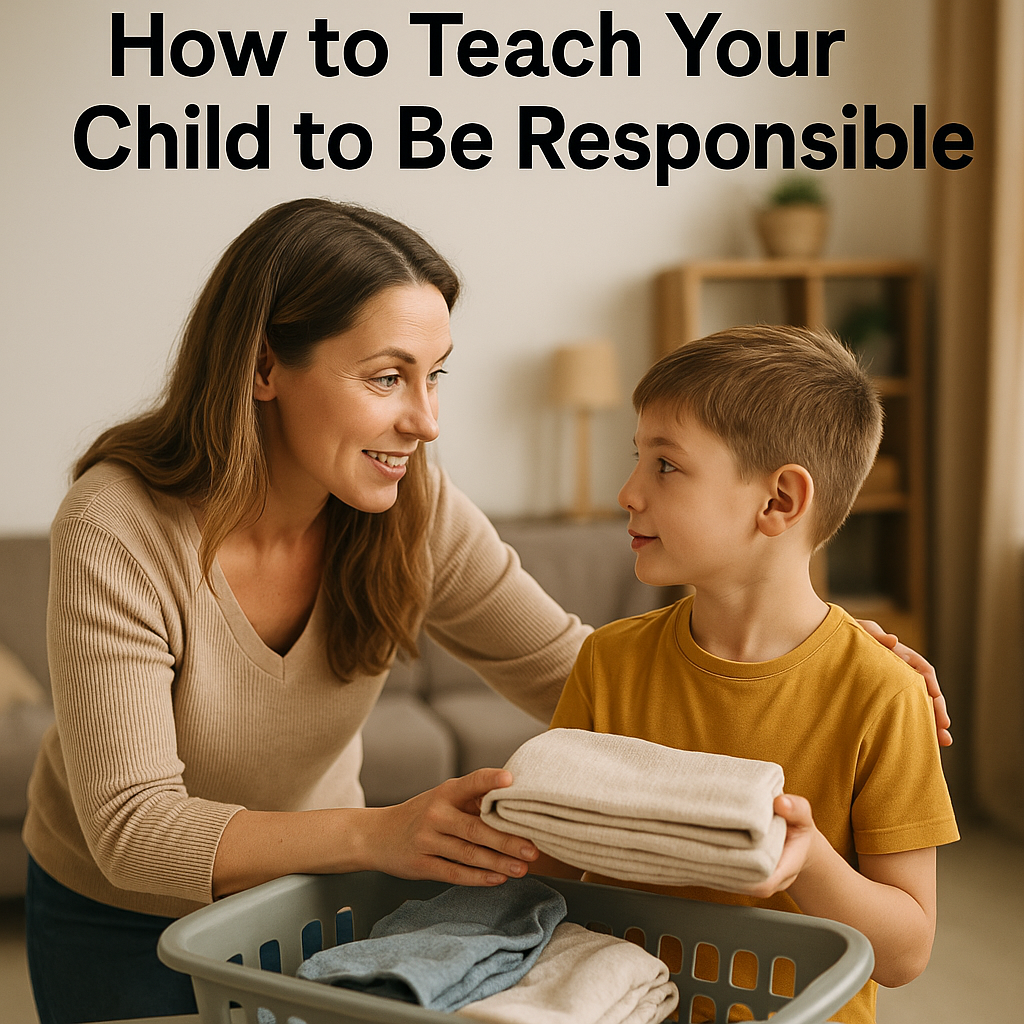Responsibility is not something children are born with — it’s a skill that develops over time through guidance, practice, and trust. When kids learn to take responsibility for their actions, tasks, and behavior, they grow into dependable, confident, and capable individuals.
Here are practical, everyday strategies to help your child build a strong sense of responsibility from a young age.
1. Start Early — and Keep It Age-Appropriate
You don’t have to wait until your child is a teenager to start teaching responsibility. Even toddlers can learn simple tasks like putting toys back or helping wipe a spill.
As your child grows, increase the level of responsibility gradually:
- Toddlers: Put away toys, feed pets with supervision
- Preschoolers: Set the table, help dress themselves
- School-age: Do homework, make their bed, help pack lunch
- Tweens/Teens: Manage schedules, chores, money, and more
Keep expectations realistic, and match tasks to your child’s abilities.
2. Give Them Real Responsibilities
Kids know the difference between a task that really matters and one that feels made-up. Whenever possible, give them real, meaningful contributions to your household.
Examples include:
- Carrying groceries
- Sorting laundry
- Taking care of a family pet
- Helping cook dinner
When children feel their efforts have value, they take pride in their role.
3. Let Them Make Choices — and Live with the Results
Responsibility involves making decisions and understanding the outcomes. Give your child chances to make age-appropriate choices:
- “Would you rather do your homework before or after dinner?”
- “You can wear your jacket or carry it — but you’re responsible if you get cold.”
This builds accountability and confidence in their decision-making.
4. Don’t Rescue Them from Every Mistake
Mistakes are powerful learning tools. If your child forgets their homework or loses a toy they left outside, resist the urge to fix it for them.
Instead, use it as a moment to reflect:
- “What can you do differently next time?”
- “How could you avoid this problem in the future?”
Natural consequences help children take ownership of their actions.
5. Model Responsibility in Your Own Life
Children learn by example. Show them how you handle your responsibilities — even the ones that are boring or difficult.
Say things like:
- “I really don’t feel like washing dishes, but I said I would.”
- “I made a mistake, so I’m going to fix it and make it right.”
Your behavior sends a stronger message than any lecture.
6. Create Routines and Systems
When tasks are part of a regular routine, they become habits. Create visual checklists or use a simple chore chart, especially for younger children.
Example morning checklist:
- Brush teeth
- Get dressed
- Make bed
- Pack backpack
Consistency builds responsibility — and reduces nagging.
7. Praise Effort and Responsibility (Not Just Results)
When your child follows through on a task, acknowledge their effort:
- “You remembered to water the plants — that’s responsible!”
- “Thank you for keeping your promise to clean up.”
This encourages them to continue behaving responsibly, even when no one is watching.
Avoid overpraising for doing the basics, but be specific and sincere when they make an effort.
8. Assign Consequences That Teach — Not Punish
If a child forgets a responsibility, use consequences that are related and helpful.
For example:
- If they don’t put away toys, they lose the chance to play with them the next day.
- If they break something by being careless, they help fix or clean it.
Avoid harsh punishments. The goal is to teach — not shame.
9. Encourage Problem Solving
When challenges come up, guide your child in figuring out a solution instead of jumping in to fix it.
Ask:
- “What do you think we should do about this?”
- “How can we make this work next time?”
This teaches initiative and accountability.
10. Celebrate Growth Over Time
Learning responsibility is a journey. Some days will be smoother than others. Celebrate progress, not perfection.
Point out how much your child has grown:
- “You used to need reminders, but now you handle that all on your own!”
- “I’m really proud of how responsible you’ve become with your schoolwork.”
These affirmations reinforce their identity as someone who can be trusted.
Final Thought: Responsibility Is a Gift You Give Your Child
Teaching responsibility isn’t about control — it’s about empowerment. When you give your child the tools and trust to take ownership of their actions, you help them build self-respect, independence, and resilience.
Over time, these everyday moments will add up — and you’ll see a capable, confident young person ready to take on the world.
